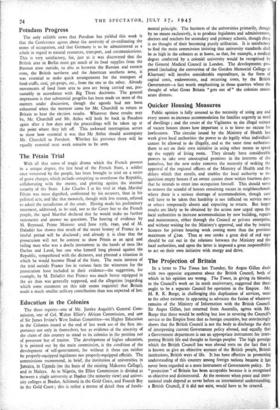The Petain Trial
With all that sense of tragic drama which the French possess in a unique degree, the late head of the French State, a soldier once venerated by the people, has been brought to trial on a series of grave charges. which include conspiring to overthrow the Republic, collaborating with the enemy, and plotting against the internal security of the State. Like Charles I at his trial in 1649, Marshal Petain was more dignified, confronted by his accusers, than in his political acts, and like that monarch, though with less reason, refused to admit the jurisdiction of the court. Having made his preliminary statement, addressed, as he said, not to the Court but to the French people, the aged Marshal declared that he would make no further statements and answer no questions. The hearing of evidence by M. Reynaud, Prime Minister until June 15th, 1940, and of M. Daladier has shown that much of the secret history of France in a fateful period will be disclosed ; and already it is clear that the prosecution will not be content to show Petain as an aged and tailing man who was a docile instrument in the hands of men like Darlan and Laval, but one who himself long plotted against the Republic, sympathised with the dictators, and planned a situation in which he would become Head of the State. The main interest of the trial outside France lies in various facts the witnesses for the prosecution have included in their evidence—the suggestion, for example, by M. Daladier that France was much better equipped in the air than was generally supposed, and the allegation (regarding which some statement on this side seems requisite) that Britain made a much smaller military contribution than was expected of her.


























 Previous page
Previous page